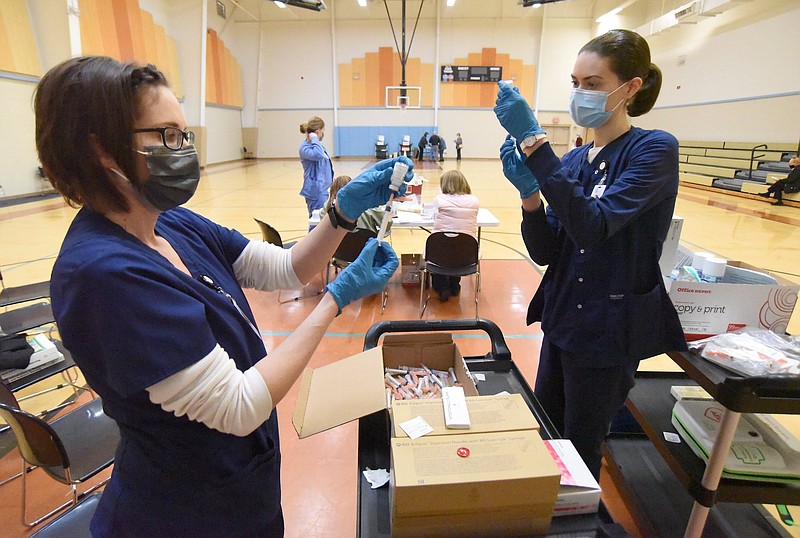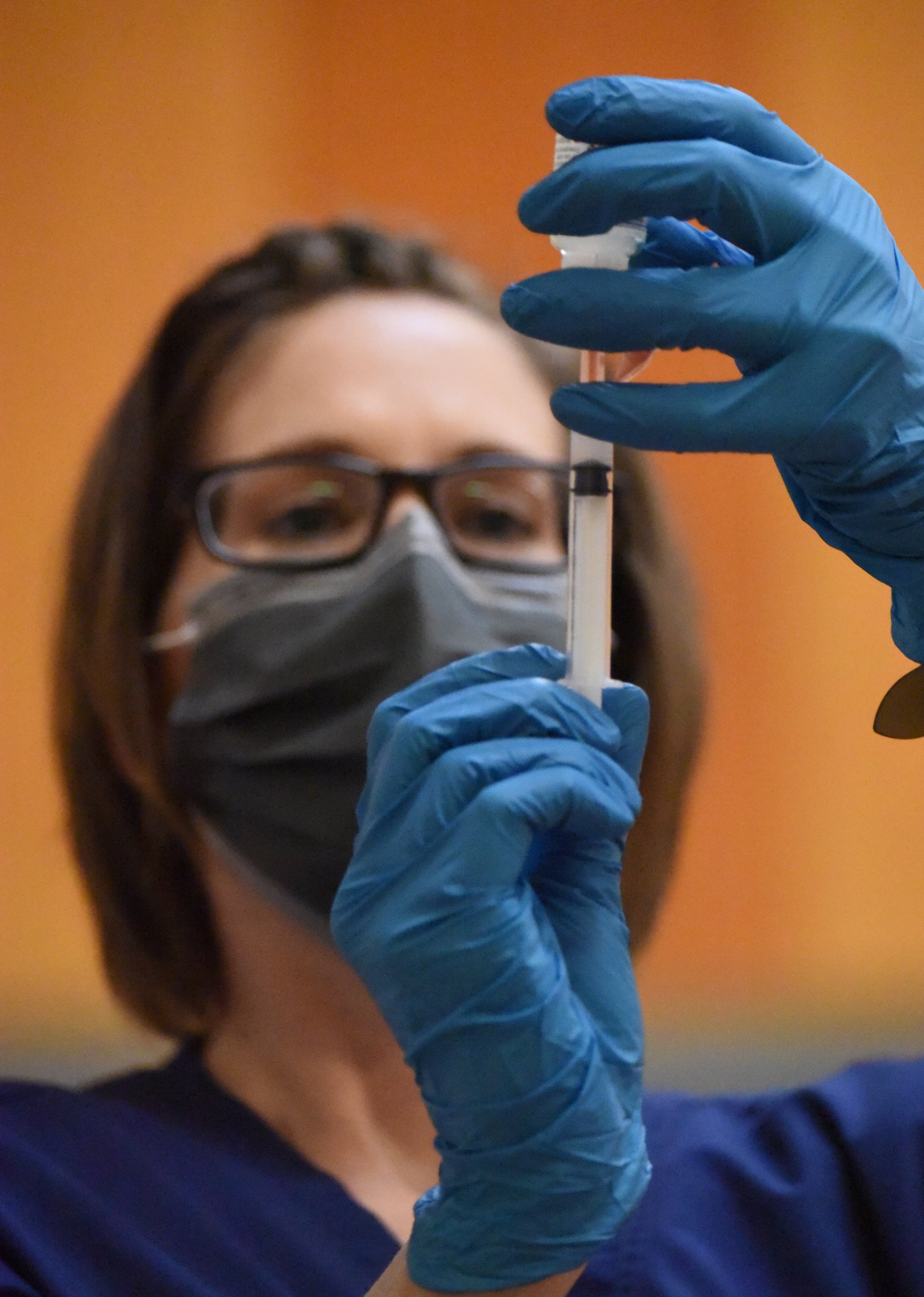The pace of the COVID-19 vaccine campaign is improving across the Chattanooga region. Supplies are steadily increasing, lines are moving faster and more doses are going into arms. Yet confusion and demand that far exceeds supply haven't waned.
Although each state has a vaccination plan, that information changes regularly. Communication is inconsistent, and the process of receiving doses varies widely between individual counties and providers.
"I'll have a couple people every day who drive up and say, 'How do I get an appointment?' And I don't know how we're missing getting the information out to those people," said Steve Lamb, Marion County's emergency management agency director, whose agency teamed up with the sheriff's office to direct traffic and provide other logistical support at the county's vaccination site.
And because data on where vaccines are going and who's receiving them is scarce, it's hard to tell how well states are reaching people who live in more rural areas, said Keith Mueller, health policy professor at the University of Iowa and director of the Rural Policy Research Institute's Center for Rural Health Policy Analysis.
"We don't know, because it's all localized," Mueller said. "At least I've not seen good information about what the number of doses is that is ultimately reaching the smaller communities administering the shots."
Dr. Lisa Piercey, Tennessee health commissioner, said during a call with the Tennessee Press Association on Wednesday that in general the demand for COVID-19 vaccines has been higher among residents of metro areas than rural areas.
"We have seen a pretty stark difference in uptake levels between urban and in rural," Piercey said. "That is across all populations - even among health care workers. We have some numbers on health care workers, because that population is pretty much complete ... in some urban areas, health care worker uptake was upwards of 90%, whereas rural uptake was around the 50% mark."
As of Friday, 12% of Meigs County, Tennessee, residents had received their first dose of COVID-19 vaccine and 5.48% had received their second dose, which is the highest percentage of any county in the Southeast Tennessee region.
With only about 12,100 residents, Meigs County has far fewer people to vaccinate in order to cover a larger percentage of the population than bigger metro counties. But Grundy County, Tennessee, which is home to about 13,300 people, has only managed to vaccinate 6% of the population with first doses and 3% with second doses - the smallest percentage of residents vaccinated among Southeast Tennessee counties.
It's unclear if Meigs County's vaccination rate is higher than other counties due to a larger percentage of eligible residents, because those details aren't provided in the Tennessee Department of Health vaccine data.
In North Georgia, the picture of who is being vaccinated is even more opaque. Neither the state nor the counties publicly report vaccine data at the county level.
In Whitfield County, health department spokesperson Jennifer King said the department has administered more than 23,000 doses of vaccine. Of those, 16,261 - nearly 70% - have been first doses.
However, those numbers don't include the thousands that have been administered at the Dalton Convention Center, which is the other site in the county offering vaccines to the public.
Neighboring Murray County, Georgia, has administered 2,135 first doses of vaccine and 588 second doses.
In the Northwest Georgia Health District - which includes Catoosa, Chattooga, Dade, Gordon, Walker and five other counties - vaccine data is even less specific. Logan Boss, spokesperson with the district, said the state is still working to publish county-specific data.
Out of almost 40,000 vaccines administered in those 10 counties, about 30,000 are first doses, Boss said Friday afternoon.
"We could do more if we had better vaccine supply. Our vaccine supply remains erratic and inadequate to meet demand," he said, adding that the number of vaccinations per day depends on vaccine availability, which also varies from county to county.
"In some of our counties, when vaccine supply is available, we've averaged one vaccination per minute," Boss said.
In the early stages of the vaccine rollout, Georgia ranked in the bottom five states for COVID-19 vaccines administered per capita. One month later, Georgia is still only ahead of four states (Idaho, Kansas, Missouri and Alabama) for total vaccine doses administered per 100,000 residents, according to the U.S. Centers for Disease Control and Prevention. Tennessee is around the middle of the pack.
When it comes to fully vaccinating residents with both doses, Tennessee is ahead of the national rate, whereas Georgia and Alabama remain at the bottom.
The North Georgia vaccine data doesn't account for those who have traveled from other counties to be vaccinated - such as people from metro Atlanta - because the wait times for appointments in more rural counties are shorter.
"We are not tracking this, but we are seeing a lot of it," Boss said. "In Paulding County, out-of-county residents receiving immunization have run as high as 40%. We know it's happening in all our counties."
Tennessee is also facing similar issues, and although residents are allowed to be vaccinated in counties outside of where they live, it can be problematic in that vaccine allocations are made to counties based on the size of the county's population.
Boss also said he and his staff have noticed people will call around and schedule multiple appointments in more than one county, book one and either forget or won't cancel the other appointments. This causes a backlog at local health departments and can leave health departments scrambling to find people to take unused vaccines before they expire at the end of the day.
It can also mean the most vulnerable residents in rural counties are missing out on vaccinations.
During the press call last week, Piercey asked newspapers to help relay vaccine information to seniors in rural areas who may not have internet access or prefer print communication.
"Everybody's messaging now revolves around social media. That is an age bracket that is not as familiar, or not as heavy users, of social media, so we need more traditional media to get to them," Piercey said, acknowledging that this is a challenge because vaccine information changes rapidly and many newspapers in small towns only publish once or twice a week.
As of last week, two out of every three Tennesseans aged 70 or older had not yet been vaccinated, she said.
"And that's really important because we know there is such a higher risk of both hospitalization and death in that age group as opposed to younger age groups," Piercey said.
Mueller said that communication with the public around vaccines needs improvement across the board.
"It's coming through so many, multiple channels, and there's still a lot of confusion," he said. "For rural areas I think the desire is there. The commitment is there. The experience of getting it done and getting it done well is what we need to grow."
Contact Elizabeth Fite at efite@timesfreepress.com or follow her on Twitter @ecfite.
Contact Patrick Filbin at pfilbin@timesfreepress.com or 423-757-6476. Follow him on Twitter @PatrickFilbin.

